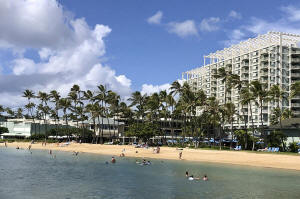Hawaii plans to increase hotel tax to help it cope with climate change
[April 30, 2025] By
AUDREY McAVOY
HONOLULU (AP) — In a first-of-its kind move, Hawaii lawmakers are ready
to hike a tax imposed on travelers staying in hotels, vacation rentals
and other short-term accommodations and earmark the new money for
programs to cope with a warming planet.
State leaders say they'll use the funds for projects like replenishing
sand on eroding beaches, helping homeowners install hurricane clips on
their roofs and removing invasive grasses like those that fueled the
deadly wildfire that destroyed Lahaina two years ago.
A bill scheduled for House and Senate votes on Wednesday would add an
additional 0.75% to the daily room rate tax starting Jan. 1. It's all
but certain to pass given Democrats hold supermajorities in both
chambers and party leaders have agreed on the measure. Gov. Josh Green
has said he would sign it into law.
Officials estimate the increase would generate $100 million in new
revenue annually.
“We had a $13 billion tragedy in Maui and we lost 102 people. These kind
of dollars will help us prevent that next disaster,” Green said in an
interview.
Green said Hawaii was the first state in the nation to do something
along these lines. Andrey Yushkov, a senior policy analyst at the Tax
Foundation, a Washington, D.C.-based nonprofit organization, said he was
unaware of any other state that has set aside lodging tax revenue for
the purposes of environmental protection or climate change.

Adding to an already hefty tax
The increase will add to what is already a relatively large duty on
short-term stays. The state's existing 10.25% tax on daily room rates
would climb to 11%. In addition, Hawaii's counties each add their own 3%
surcharge and the state and counties impose a combined 4.712% general
excise tax on goods and services including hotel rooms. Together, that
will make for a tax rate of nearly 19%.
The only large U.S. cities that have higher cumulative state and local
lodging tax rates are Omaha, Nebraska, at 20.5%, and Cincinnati, at
19.3%, according to a 2024 report by HVS, a global hospitality
consulting firm.
The governor has long said the 10 million visitors who come to Hawaii
each year should help the state's 1.4 million residents protect the
environment.
Green believes travelers will be willing to pay the increased tax
because doing so will enable Hawaii to “keep the beaches perfect” and
preserve favorite spots like Maui's road to Hana and the coastline along
Oahu's North Shore. After the Maui wildfire, Green said he heard from
thousands of people across the country asking how they could help. This
is a significant way they can, he said.
Hotel industry has mixed feelings
Jerry Gibson, president of the Hawaii Hotel Alliance, which represents
the state's hotel operators, said the industry was pleased lawmakers
didn't adopt a higher increase that was initially proposed.
[to top of second column] |

People are seen on the beach and in the water in front of the Kahala
Hotel & Resort in Honolulu, Nov. 15, 2020. (AP Photo/Jennifer Sinco
Kelleher, File)
 “I don’t think that there’s anybody
in the tourism industry that says, ‘Well, let’s go out and tax
more.’ No one wants to see that," Gibson said. "But our state, at
the same time, needs money.”
The silver lining, Gibson said, is that the money is supposed to
beautify Hawaii’s environment. It will be worth it if that’s the
case, he said.
Hawaii has long struggled to pay for the vast environmental and
conservation needs of the islands, ranging from protecting coral
reefs to weeding invasive plants to making sure tourists don't
harass wildlife, such as Hawaiian monk seals. The state must also
maintain a large network of trails, many of which have heavier foot
traffic as more travelers choose to hike on vacation.
Two years ago, lawmakers considered requiring tourists to pay for a
yearlong license or pass to visit state parks and trails. Green
wanted to have all visitors pay a $50 fee to enter the state, an
idea lawmakers said would violate U.S. constitutional protections
for free travel.
Boosting the lodging tax is their compromise solution, one made more
urgent by the Maui wildfires.
A large funding gap
An advocacy group, Care for Aina Now, calculated a $561 million gap
between Hawaii's conservation funding needs and money spent each
year.
Green acknowledged the revenue from the tax increase falls short of
this, but said the state would issue bonds to leverage the money it
raises. Most of the $100 million would go toward measures that can
be handled in a one-to-two year time frame, while $10 to $15 million
of it would pay for bonds supporting long-term infrastructure
projects.
Kāwika Riley, a member of the governor's Climate Advisory Team,
pointed to the Hawaiian saying, “A stranger only for a day,” to
explain the new tax. The adage means that a visitor should help with
the work after the first day of being a guest.
“Nobody is saying that literally our visitors have to come here and
start working for us. But what we are saying is that it’s important
to be part of of the solution,” Riley said. “It’s important to be
part of caring for the things you love.”
All contents © copyright 2025 Associated Press. All rights reserved
 |